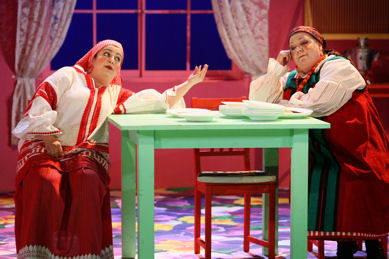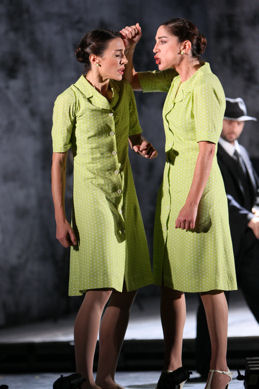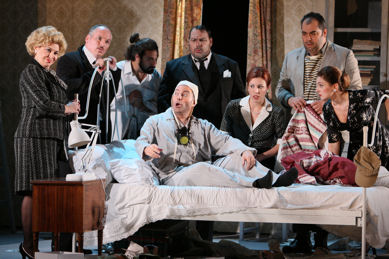Other Links
Editorial Board
- Editor - Bill Kenny
- London Editor-Melanie Eskenazi
- Founder - Len Mullenger
Google Site Search
SEEN
AND HEARD INTERNATIONAL OPERA REVIEW
Stravinsky, Weill and Puccini:
Greek National Opera, GNO Orchestra under Martin André,
25.11.2007 (BM)
Weill: Die Sieben Todsünden
Puccini: Gianni Schicchi
This season’s
first premiere was a triple bill of three short operas from the
post-war period, a bold and fascinating combination reflecting the
era’s cultural and ethical “feeling” that still had ex-artistic
director Stefanos Lazaridis’ name written all over it.
Next came Die Sieben Todsünden (The Seven Deadly Sins),
directed by Kim Brandstrup and performed in Greek rather than the
original German by Bertolt Brecht (and I’m almost willing to bet
that this was not Lazaridis’ idea.) But what was even more
unfortunate was the choice of Amalia Moutoussi for the leading
role of Anna I. She is a fine actress (with a definitive
performance of Elektra under her belt), but though this role may
not call for an opera singer, it does require an artist who can
sing well enough not to come in frequently off -key. The
result was that she simply sounded loud and coarse, as opposed to
determined and go-getting, and alas even Maria Koussouni’s
exquisite dancing as Anna II was not enough to offset the effect.
The production was greatly enhanced by the “family”, a kind of
take-off on a barbershop quartet in cowboy hats, and in particular
by Dimitris Kassioumis with his booming bass in the role of the
mother, who did a much better job in making the plot come together
than the narrator.
By this time most of the audience was truly looking forward to Gianni Schicchi, and director Fulljames rose to the occasion
by presenting a clever contemporary version of this popular work,
aptly focused on the idea of xenophobia- “What, my nephew wants to
marry that Albanian’s daughter???” This, and the age-old issue
of inheritance scheming were themes that most present
could relate to. Besides, the appealing staging included some
first-rate singers in an almost all-Greek ensemble, especially the
lovely Irini Kyriakidou as Lauretta. Some say she still sounds
slightly immature, but in this role that was rather an advantage and
I am convinced that hers is a name to look out for in future. Michael Fabiano, seemed more comfortable doing his thing in
the role of Rinuccio than earlier in the Stravinsky and the title
role was sung by a likeable Yannis Yannissis, with his bristling,
high baritone and excellent diction, dressed like a foreign worker
straight off a construction site in keeping with the director’s
intentions.
Stravinsky: Mavra

Stravinsky’s Mavra was staged for the first time in Greece,
in a babushka-like version directed by John Fulljames, very much
in keeping with the spirit of the Pushkin poetry to which it is dedicated. Judith Howarth was an intense Parasha, and Husar Vasily alias
the servant girl Mavra was sung by Michael Fabiano, agreeably and
not without humor. The set consisted of a slightly slanted,
rotating house, which was subsequently done up in different colors
for both following works by Richard Hudson, who also designed the
costumes.


The musicians of GNO orchestra were clearly at ease with conductor
Martin André, allowing them to successfully deal with the quirks
of three very different scores, although their enthusiasm went a
bit too far during some of the passages of the Puccini: one
would have wished there was a way to turn down the volume in order
to hear the singers. All in all, a very rewarding evening, even if
two extremely long intervals extended it rather further than
necessary.
The Board of Directors at GNO may well live to regret their
untimely ousting of Lazaridis, whose successor is yet to be
appointed. Those of us familiar with his work as a set
designer can only hope that he may at least be invited to bring
his vision back to this opera company in that capacity – if he can
still be bothered, that is.
Bettina Mara
Pictures © Stefanos
Back
to Top
Cumulative Index Page
